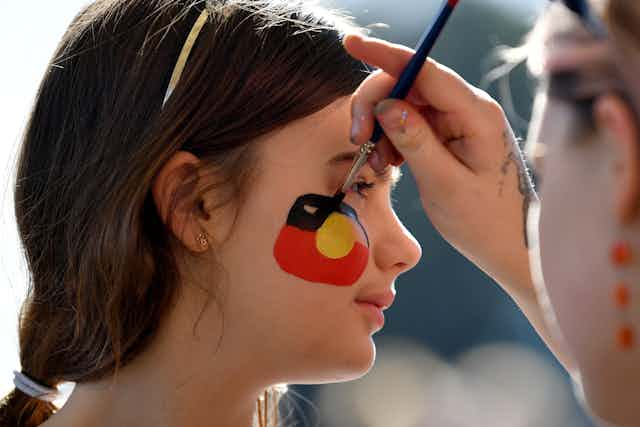A referendum to recognise First Nations Australians in Australia’s Constitution by establishing a Voice to Parliament will be held later this year. The Voice would be an advisory body allowing Aboriginal and Torres Strait Islander people to make representations to parliament and government on matters that affect them.
Campaigning for the “yes” and “no” sides is well under way. However, misinformation and disinformation are a feature of some of the public discussion. Indigenous Australians Minister Linda Burney this week even accused the “no” campaign of engaging in “post-truth politics”.
The Australian Electoral Commission has an online referendum process disinformation register. This is focused on disinformation about the referendum process rather than fact-checking claims made about the Voice.
Several media outlets including RMIT ABC Fact Check, AAP Fact Check and AFP Fact Check are publishing articles fact-checking claims about the Voice.
But why is it legal for politicians and other campaigners to lie to you?
Read more: 10 questions about the Voice to Parliament - answered by the experts
Telling lies is legal
It is perfectly legal to spread misinformation and disinformation and tell outright lies about the proposed constitutional amendment, just as it is legal to tell lies during federal election campaigns.
While Australia has laws banning businesses from engaging in deceptive and misleading advertising about their products and services, there are no equivalent federal laws that apply to politics. By contrast, South Australia and the ACT have truth-in-political-advertising laws applying to their state and territory election campaigns.
There is one tiny exception to the current ability to mislead voters about the referendum. It is unlawful to mislead voters about how to fill in the referendum ballot form. For example, you would be breaking the law if your advertisement said people had to tick a box on the ballot form (when in fact you need to write “yes” or “no”).
Parliament decided to allow lies during the referendum campaign
The federal parliament passed up an opportunity to ban misinformation and disinformation during the referendum campaign. In January, the parliament’s Joint Standing Committee on Electoral Matters rejected calls to do this.
The committee said “the forthcoming referendum is not the right time to establish a truth-in-political-advertising regime”.
However, the same committee recommended in June that Australia adopt federal truth-in-political-advertising laws that would apply to all future federal elections and referendums.
How do truth in political advertising laws operate?
The South Australian laws have been in operation since 1985. Those laws work by making it unlawful for political advertisers to make purported statements of fact that are misleading to a material extent.
Importantly, these laws don’t seek to stop people expressing their opinions, even the most silly and uninformed opinions.
The key distinction is between purported statements of fact and opinions.
So, for example, in 1995 the South Australian Supreme Court heard a case about an election ad claiming the state government had said schools with fewer than 300 students would be subject to closure. The ad was found to contravene the law. The government had never said that. The statement was a purported statement of fact and it was misleading.
By contrast, in a 2010 case the South Australian Supreme Court rejected an argument that a leaflet accusing a politician of being “soft on crime” breached the law. That statement was simply an opinion.
Most cases in South Australia don’t end up in court. The law allows the Electoral Commission to request that misleading advertisements be taken down and a retraction issued.
Do these laws actually work?
The most important goal of truth-in-political-advertising laws is to improve political practice and promote a better political culture. That is, the goal is prevention of misinformation and disinformation, rather than punishment.
The South Australian electoral commissioner, who enforces the state’s truth-in-political-advertising laws as the independent regulator, has commented that such laws have a meaningful impact in reducing misleading electoral advertising and do so because of the political culture the existence of the law has helped to create.
Federal parliament’s Joint Standing Committee on Electoral Matters says “lies, misinformation and disinformation are spreading at an exponential rate” and that the South Australian model of truth-in-political-advertising laws is “successful”.
So it is a great shame that the federal parliament decided to allow misinformation and disinformation during the referendum campaign.

